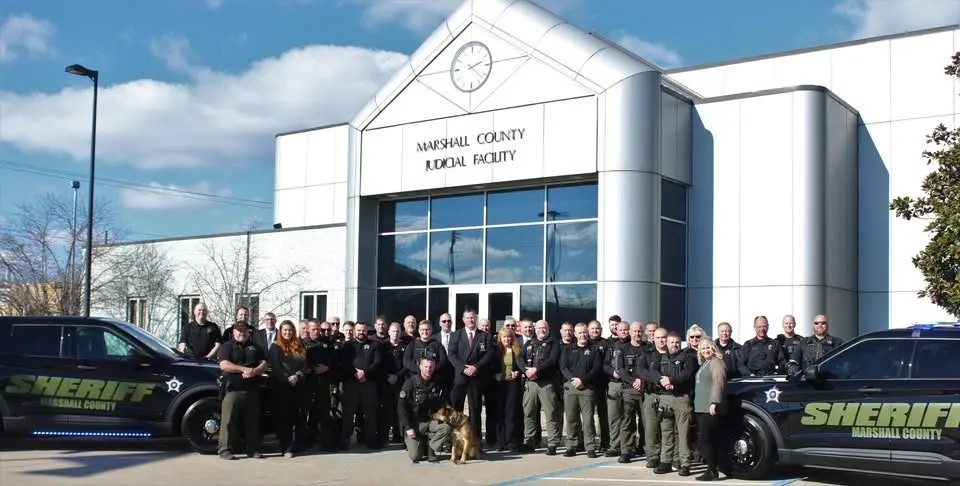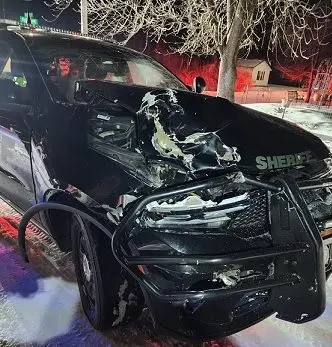Marshall County Judge Executive Kevin Neal hopes education leaders will consider listening to victims and families impacted by the Jan. 23 high school shooting that claimed the lives of two local students.
Last week Neal released recommendations on what the district could do based off his years in law enforcement and what families have asked for, including metal detectors and additional resource officers. On Friday, Superintendent Trent Lovett released an update on what the district has been doing and plans to do.
Neal said victims families had contacted him in frustration that not enough was getting done.
“The families that have reached out to me, they have talked to Trent Lovett, they’ve talked to [Sheriff] Kevin Byars, and they just feel like they’re not getting any information and that nothing is getting done,” Neal said. “The families that contacted me wanted something done immediately.”
Neal said victims families are still struggling as incidents of bullying and assault are being reported, along with threats of more violence hanging over the county.
“We’ve had something like eight juvenile arrests; there are victims being bullied,” Neal said. “One of the victims that was shot has been assaulted…. We’ve got to put something in place in the immediate to mitigate the next event.”
Neal said the district asked him — along with other members of the community — to review Marshall County Schools’ 257-page emergency response plan. The state requires districts to update their policies regularly. Neal said he met with the rest of the committee in February.
“Initially they wanted the county to be the administrator of federal funds,” Neal said. “I made it known then what my opinion was with Special Law Enforcement Officers.”
Neal, a retired police officer, is advocating for the district to take advantage of Kentucky Revised Statutes allowing for Special Law Enforcement Officers. He said he doesn’t have any legislative or decision making ability for the school district, but released his opinion last week as a member of the committee and on behalf of concerned families.
The use of SLEOs is not new to the area. McCracken County Schools began using SLEOs to protect students and deter crime on campus following the Heath High School shooting in 1997. The district has eight officers in total, all former full-time law enforcement at other agencies. Under the direction of supervisor Larry Zacheretti, McCrack County’s SLEOs provide the same services as a traditional deputy or school resource officer for about half the cost.
SLEOs typically work on a calendar similar to teachers and other school staff, meaning districts only have to pay for 186 days of service. A full-time sheriff’s deputy works year-round, creating the cost difference.
Neal said the reduced calendar makes the position appealing to law retired law enforcement officers looking to stay active in the field, but not wanting the same schedule.
SLEOs have the authority to arrest, use deadly force and detain individuals. They’re also required to receive the same training as other law enforcement officers. The main difference is their duties are restricted to the school.
“You get more with your SLEOs with the same dollars than you would with deputies,” Neal said. “[The Marshall County High School] campus needs more presence. You can maximize that for the same dollars.”
Neal contacted Zacheretti in McCracken County to determine the district’s expected expense. According to Neal, if the district paid a similar rate and provided equipment, it would cost about $32,500. On the other hand, the annual salary cost for a sheriff’s deputy is about $58,000, down from $98,000 the first year as the county would have to equip and purchase a vehicle.
Neal said his numbers don’t include the cost of health insurance, which would have to be provided. Even with rough estimates of those costs, the district could still provide nearly twice as many law enforcement officers as the sheriff’s department.
Neal’s recommendation also include portable metal detectors and Xray machines. As of last week, no requests for funding had been made for those devices on behalf of the district through state and federal programs.
According to Lovett’s release, the district has been using monitors to survey campus. Students at MCHS said the monitors primarily patrol the parking lot.
The Marshall County Board of Education will hold its regular monthly meeting Monday, March 19 at 6 p.m. in the board office.







